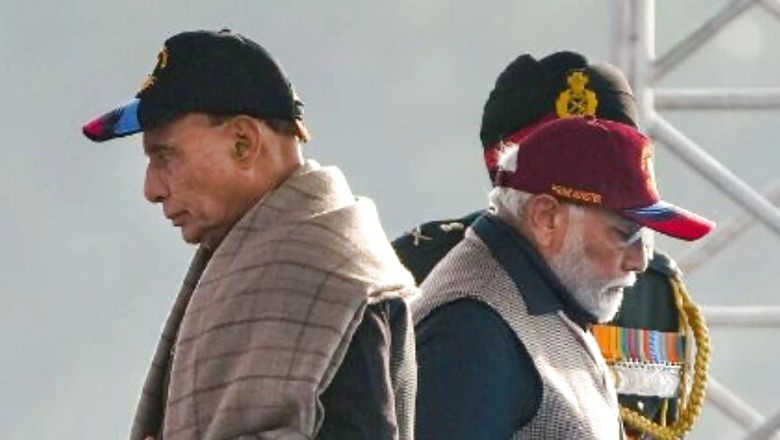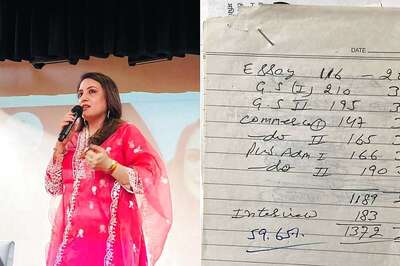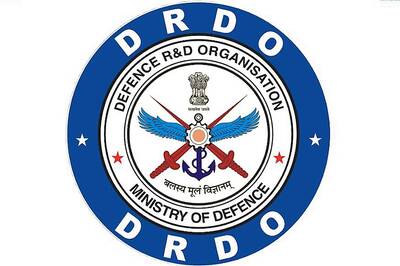
views
Defence Minister Rajnath Singh’s assertion to News18 that cross-border terrorism from Pakistan will be met with asymmetric cross-border retaliation is being viewed as a signal of India’s unabashed public embrace of unorthodox tactics to eliminate security threats.
Singh, normally reticent in his public pronouncements, was unequivocal in his response to a question by Network18’s Editor-in-Chief Rahul Joshi about a report in The Guardian newspaper which claimed that Indian agencies had a hand in the assassination of 20 terrorists inside Pakistan.
“Whichever terrorist tries to disturb India from our neighbouring country or carries out terrorist attacks here, we will retaliate against them harshly," Singh, 72, said in the interview on Friday. “If he flees to Pakistan, we will enter Pakistan and kill him."
Although election-season language is normally stronger than usual, the context of the defence minister’s statement as well as the fact that it is Singh saying it, is being perceived as open signalling by India of its intention to employ a full range of tactics to beat back terror wherever it emanates from.
Singh, when asked about PM Modi’s statements on India’s tough approach to cross-border terror, said “whatever the prime minister had said is correct (Ghar main Ghus ke maarne vali Baat) as India has that power and now Pakistan also realises this".
Speaking to CNN-News18, Lt General (retired) Sanjay Kulkarni said what Singh probably meant was the reference to the surgical series in Pakistan like Balakot.
“Those strikes by India have put Pakistan on the back foot and Pakistan dare not to do anything mischievous as it was planning to do earlier or use terrorism as an instrument of state policy as blatantly as they were doing earlier…because Pakistan now knows and understands that India will react if they do it again," Kulkarni told News18.
Maj Gen Harsha Kakar, defence expert, said: “The defence minister’s comment shows the ability of the nation to strike at terror emanating from other countries, especially in the neighbourhood. It is in no way an admission that India has killed terrorists inside other countries, especially Pakistan, as The Guardian wants us to believe."
BJP spokesperson Shehzad Poonawalla said there has been a change in the template of response to terrorism. “Big terror attacks are down now — be it in J&K or Left-wing extremism. After the 26/11 attacks in Mumbai, Air Chief Marshall Fali Homi Major told Manmohan Singh that they could carry out air strikes on camps in Pakistan but the Congress government gave Pakistan ‘Most Favoured Nation’ status. Today, the template is ‘Muh Tod jawab’ with surgical strikes in Pakistan after terror acts," Poonawalla said.
PM Modi has also spoken twice about his government’s approach of ‘Ghar Mein Ghus Ke Maara’ in his election rallies in Bihar and Rajasthan in the last two days. This call from the Narendra Modi-led BJP worked wonders for the party in the 2019 Lok Sabha elections, after people gave a resounding thumbs-up to India’s twin surgical strikes in Pakistan in 2016 and 2019.
The latest ‘The Guardian’ article, on how the Indian government ordered assassinations in Pakistan as part of a wider strategy to eliminate terrorists on foreign soil, will only buttress and bolster that image of the BJP’s ‘no-nonsense’ approach against terror emanating from Pakistan soil, say political experts. The foreign ministry has denied the assertions in the article but the statements of the prime minister and the defence minister are leaving the matter open to interpretation.
INDIA TALKS TOUGH ON TERROR
The Narendra Modi government has adopted a zero-tolerance approach to terror, with India giving a befitting reply to Pakistan via not just military but also diplomatic channels.
Recently, External Affairs Minister S Jaishankar, while speaking at the Pandit Hriday Nath Kunzru Memorial Lectures 2024 said, “On the western front, the long-standing challenge of cross border terrorism now elicits more befitting responses. Believe me, Uri and Balakot sent their own message."
At another event, while discussing his book ‘Why Bharat Matters’, Jaishankar explained how India won’t talk to Pakistan if it means accepting terrorism. “What Pakistan was trying to do, not now but over multiple decades, was really to use cross-border terrorism to bring India to the table. That, in essence, was its core policy. We have made that irrelevant by not playing that game now," he said.
The minister’s assertions underlined that while India could not choose its neighbours, interactions could no longer be dictated by tactics that the country does not stand by.
In 2022, India had declared its intention for normal relations with Pakistan, contingent on a terror-free environment. This was in response to the then Pakistani Prime Minister Shehbaz Sharif’s overture for dialogue. India’s Ministry of External Affairs had reiterated its desire for peaceful coexistence with all neighbours, including Pakistan, underpinning the necessity of a terror-free ambience. Since then, India has emphasised that while it is open to talks, it needs an atmosphere devoid of terror and hostility as a prerequisite for any dialogue.
The government’s tough stance also seems to have worked on the ground as recent reports indicate a significant decrease in terrorist activity stemming from Pakistani border outposts in the last six months.
According to top intelligence sources, Pakistani forces were earlier aiding terrorists with infiltration and tunnel construction apart from other activities. The change in behaviour seems to be a response to increased pressure and vigilance from Indian security forces.
A senior official told News18 that terror outfits have moved their launchpads, which are now away from the actual border. Due to India’s long-range surveillance system, terror outfits are trying to hide and are moving their launchpads kilometres away from the border as a safer option.
THE TRADE FACTOR
Since 2019, when Pakistan-linked terrorists carried out the Pulwama attack, trade between India and Pakistan has been at a near-complete standstill. Going a step further, India stripped Pakistan of its “most favoured nation" status, effectively placing a 200 per cent duty on Pakistani imports. As India revoked J&K’s special status in August 2019, an outraged Islamabad downgraded diplomatic ties and suspended bilateral trade. However, five years later, the cash-strapped neighbour is looking to revive trade ties.
Recently, Pakistan’s Foreign Affairs Minister Ishaq Dar said the country will “seriously examine" the question of resuming trade with India. “Pakistani businessmen want trade to resume with India," declared Dar in a sign of the heat on the government from traders and business owners in Punjab.
India’s ascendance as a global power means the country remains the fastest-growing economy in the world and is slated to become the country with the third-largest GDP in the world by 2027. As India climbs the diplomatic ladder, armed with its growing influence under the leadership of PM Modi, the neighbour has had a tough time keeping its house in order.
In Pakistan’s financial year that ended in June 2023, more than 12 million people fell into poverty, according to the World Bank. The debt burden, combined with inflation, ever-increasing prices of essential commodities and constant attacks by Baloch rebels and Pashto militants have pushed the country to the brink, explaining the interest in resuming trade ties with India.
India, however, is not keen to budge as its pre-condition of eliminating terror emanating from Pakistan’s soil remains unfulfilled. Also, Pakistan will have to bite the bullet and accept that the reality in Jammu and Kashmir has been permanently altered with the abrogation of Article 370 and it has no claim in the Valley.
Pakistan has been insisting that the onus of improving the ties was on India and urging it to undo its “unilateral" steps in Kashmir as a sort of pre-condition to start the talks.
India has dismissed the suggestion and made it clear to Pakistan that the entire Union Territories of Jammu and Kashmir and Ladakh were integral and inalienable parts of the country. New Delhi has also asserted that the constitutional measures taken by the Indian government to ensure socio-economic development and good governance in the Union Territory of Jammu and Kashmir are matters internal to India.
Lately, Prime Minister Modi in a post on X congratulated Shehbaz Sharif on becoming the head of Pakistan’s government, prompting hopes for a diplomatic thaw. Sharif responded days later with an equally curt post, thanking Modi for his felicitations. The Sharif-led coalition government came to power after the February 8 elections but it began its tenure with a dwindling economy which needs immediate improvement.



















Comments
0 comment